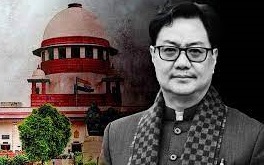Check, do not cross: On the government’s attack on the judiciary
Government should work towards systemic reform, and not attack the judiciary
There is something rude and unpleasant in the way the Government is going about the task of demanding a big say in the appointment of judges in constitutional courts. The latest salvo is from Union Law Minister Kiren Rijiju, who has written to the Chief Justice of India to request that the executive be given a role in the appointment process, which now is being handled by a Collegium of judges. Reports Say that the Minister wants the formation of a search-and-evaluation committee, with Government representatives, to suggest names to the collegiums in the High Courts and the Supreme Court for appointments. He is also understood to have asked for a representative of the Union government in the Supreme Court collegium, and a State government’s representative in the High Court collegiums. The letter comes as the latest in a series of official fulminations against the judiciary. Mr. Rijiju has been at the forefront of this attack, frequently questioning the collegium system by rightly highlighting some of its acknowledged flaws. There is little doubt that the Government’s anger is towards the 2015 judgment of a Constitution Bench striking down the formation of a National Judicial Appointments Commission (NJAC). While few would disagree that the Collegium system needs reform, the Government’s motive in carrying on a campaign against the judiciary in the name of seeking reform in the appointments process is questionable.
The answers to some of the issues raised by the Government are quite simple, and has been repeatedly pointed out by the Court, as well as the political opposition. It can address the need for a more transparent and independent process by making a fresh legislative effort to establish a neutral mechanism that does not impinge on the independence of the judiciary. Until such an exercise to amend the Constitution achieves fruition, it has to abide by the law of the land, that is, the present system of appointments through the Collegium. It is difficult to avoid the impression that the Government’s tactics are bordering on veiled warnings: deliberately delaying action on recommendations; ignoring reiterated names even after multiple reconsiderations ; and carrying on a campaign to delegitimise the institution. It is surprising that it seeks to rein in a judiciary that has been quite accommodative of the Government’s concerns on the judicial side in recent years. The only conclusion is that the current regime wants absolute control over who gets to be a judge in this country. A system of checks and balances that prevents any one branch gaining the upper hand is essential for democratic functioning.
